Nicholas Adams-Cohen
Dynamic Social Media Monitoring for Fast-Evolving Online Discussions
Feb 24, 2021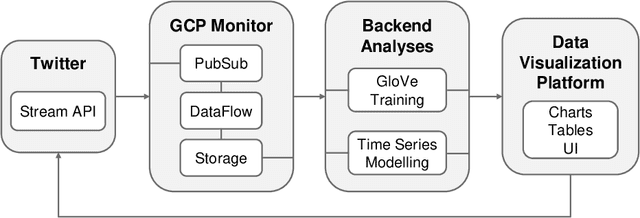
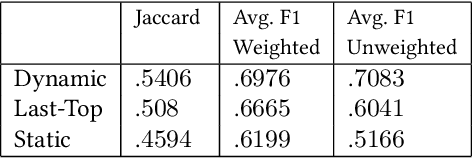
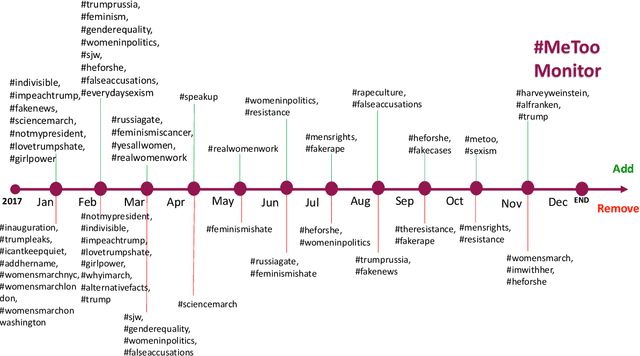
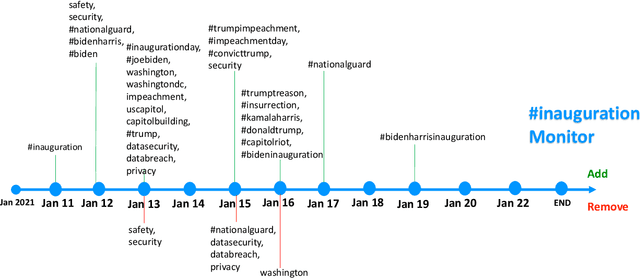
Abstract:Tracking and collecting fast-evolving online discussions provides vast data for studying social media usage and its role in people's public lives. However, collecting social media data using a static set of keywords fails to satisfy the growing need to monitor dynamic conversations and to study fast-changing topics. We propose a dynamic keyword search method to maximize the coverage of relevant information in fast-evolving online discussions. The method uses word embedding models to represent the semantic relations between keywords and predictive models to forecast the future time series. We also implement a visual user interface to aid in the decision-making process in each round of keyword updates. This allows for both human-assisted tracking and fully-automated data collection. In simulations using historical #MeToo data in 2017, our human-assisted tracking method outperforms the traditional static baseline method significantly, with 37.1% higher F-1 score than traditional static monitors in tracking the top trending keywords. We conduct a contemporary case study to cover dynamic conversations about the recent Presidential Inauguration and to test the dynamic data collection system. Our case studies reflect the effectiveness of our process and also points to the potential challenges in future deployment.
Leveraging the Power of Place: A Data-Driven Decision Helper to Improve the Location Decisions of Economic Immigrants
Jul 27, 2020



Abstract:A growing number of countries have established programs to attract immigrants who can contribute to their economy. Research suggests that an immigrant's initial arrival location plays a key role in shaping their economic success. Yet immigrants currently lack access to personalized information that would help them identify optimal destinations. Instead, they often rely on availability heuristics, which can lead to the selection of sub-optimal landing locations, lower earnings, elevated outmigration rates, and concentration in the most well-known locations. To address this issue and counteract the effects of cognitive biases and limited information, we propose a data-driven decision helper that draws on behavioral insights, administrative data, and machine learning methods to inform immigrants' location decisions. The decision helper provides personalized location recommendations that reflect immigrants' preferences as well as data-driven predictions of the locations where they maximize their expected earnings given their profile. We illustrate the potential impact of our approach using backtests conducted with administrative data that links landing data of recent economic immigrants from Canada's Express Entry system with their earnings retrieved from tax records. Simulations across various scenarios suggest that providing location recommendations to incoming economic immigrants can increase their initial earnings and lead to a mild shift away from the most populous landing destinations. Our approach can be implemented within existing institutional structures at minimal cost, and offers governments an opportunity to harness their administrative data to improve outcomes for economic immigrants.
Finding Social Media Trolls: Dynamic Keyword Selection Methods for Rapidly-Evolving Online Debates
Nov 16, 2019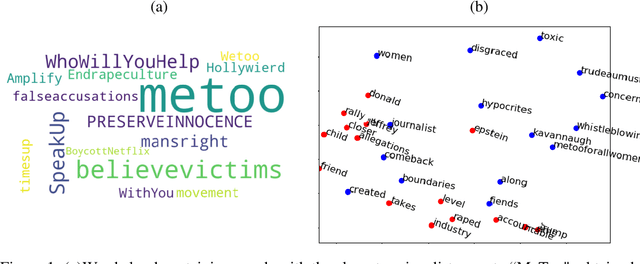

Abstract:Online harassment is a significant social problem. Prevention of online harassment requires rapid detection of harassing, offensive, and negative social media posts. In this paper, we propose the use of word embedding models to identify offensive and harassing social media messages in two aspects: detecting fast-changing topics for more effective data collection and representing word semantics in different domains. We demonstrate with preliminary results that using the GloVe (Global Vectors for Word Representation) model facilitates the discovery of new and relevant keywords to use for data collection and trolling detection. Our paper concludes with a discussion of a research agenda to further develop and test word embedding models for identification of social media harassment and trolling.
 Add to Chrome
Add to Chrome Add to Firefox
Add to Firefox Add to Edge
Add to Edge